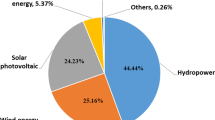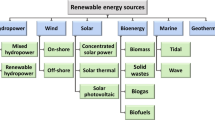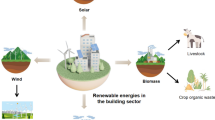Abstract
This paper gives a short overview of the German Energiewende, i.e. the transition of a large and mostly thermal electricity system towards electricity generation from renewable energy source. It discusses both, the motivation of the transitions as future goals and current status. Furthermore, it gives an in-depth view into the changes in economic costs for society as well as electricity price effects, especially for average private households and industrial consumers. It also discusses the benefits of the promotion of renewable energies in Germany.
Similar content being viewed by others
References
IRENA (International Renewable Energy Agency). Data and statistics of capacity and generation. 2016, http://resourceirena. irena.org
Renewable Energy Sources Act (Renewable Energy Sources Act—RES Act 2014). 2014, http://www.bmwi.de/English/Redaktion/Pdf/renewable-energy-sources-act-eeg-2014
Joas F, Pahle M, Flachsland C, Joas A. Which goals are driving the Energiewende? Making sense of the German Energy Transformation. Energy Policy, 2016, 95: 42–51
Federal Government. German Federal Government’s National Electromobility Development Plan. 2009, https://www.bmwi.de/English/Redaktion/Pdf/national-electromobility-developmentplan
Federal Ministry for Economic Affairs and Energy (FMEE). Time Series about the Development of Renewable Energies in Germany (in Germany). 2016, http://www.erneuerbare-energien.de/EE/Navigation/DE/Service/Erneuerbare_Energien_in_Zahlen/Zeitreihen/zeitreihen.html
Federal Ministry for Economic Affairs and Energy (FMEE). The Energy of the Future–5th Monitoring Report of the Energy Transition (long version, in German). 2016, http://www.bmwi.de/DE/Themen/Energie/Energiewende/monitoring-prozess.html
Federal Office for Motor Traffic. Annual count of the stock of vehicles. 2016, http://www.kba.de/DE/Statistik/Fahrzeuge/Bestand/b_jahresbilanz.html?nn = 644526
Federal Government. Directory sustainability–outcome and perspectives. 2005, https://www.bundesregierung.de/Content/DE/_Anlagen/Nachhaltigkeit-wiederhergestellt/wegweiser-nachhaltigkeit. html
Federal Government. Progress report 2008 on the national strategy for sustainable development—for a sustainable German. 2008, https://www.bundesregierung.de/Content/DE/_Anlagen/Nachhaltigkeit- wiederhergestellt/2009-05-13-fortschrittsbericht-2008-englisch. html?nn = 507880
Federal Ministry for Economic Affairs and Energy (FMEE). Compensations, differential costs and EEG-surcharge 2000 until 2017 (in Germany). 2016, http://www.erneuerbare-energien.de/EE/Redaktion/DE/Downloads/eeg-in-zahlen-pdf.html
Joskow P L. Comparing the costs of intermittent and dispatchable electricity generating technologies. American Economic Review, 2010, 101(3):238–241
Netztransparenz 2016. Overview for market values and reference market values. 2016, https://www.netztransparenz.de/EEG/Marktpraemie/Marktwerte
Kost C, Mayer J N, Thomsen J, Hartmann N, Senkpiel C, Philipps S, Nold S, Lude S, Saad N, Schlegl T. Levelized cost of electricity renewable energy technologies. 2013, https://www.ise.fraunhofer. de/en/publications/veroeffentlichungen-pdf-dateien-en/studien-undkonzeptpapiere/study-levelized-cost-of-electricity-renewable-energies.pdf
Fraunhofer I S E. Current and future cost of photovoltaics: long-term scenarios for market development, system prices and LCOE of utility-scale PV systems. 2015, https://www.agora-energiewende. de/fileadmin/downloads/publikationen/Studien/PV_Cost_2050/AgoraEnergiewende_Current_and_Future_Cost_of_PV_Feb2015_ web.pdf
Dillig M, Jung M, Karl J. The impact of renewables on electricity prices in Germany—an estimation based on historic spot prices in the years 2011–2013. Renewable & Sustainable Energy Reviews, 2016, 57: 7–15
Federal Network Agency. Approval of scenarios for the electricity grid extension plans 2017–2030 (in Germany). 2016, http://data. netzausbau.de/2030/Szenariorahmen_2030_Genehmigung.pdf
TSOs (Transmission System Operators). 50 Hertz Transmission GmbH, Amprion GmbH, Transnet BW GmbH, TenneT TSO GmbH. 2016, https://www.netztransparenz.de/Portals/1/Content/Erneuerbare-Energien-Gesetz/EEG-Umsetzungshilfen/EEG-Verguetungskategorien_ EEG_2016_20161020.xls
BDEW. (Federal Association of the Energy andWater Industry). Net electricity consumption of different customer groups (in Germany). 2016, https://www.bdew.de/internet.nsf/id/DE_Energiedaten#cat/Daten%2FGrafikenEnergie%20allgemeinEnergiedaten…% 20Stromversorgung/3-12-netto-elektrizitaetsverbr-nach-verbrauchergruppen-de
BDEW. (Federal Association of the Energy and Water Industry). BDEW electricity price analysis. 2016, https://www.bdew.de/internet.nsf/res/886756C1635C3399C1257FC500326489/$file/160524 _BDEW_Strompreisanalyse_Mai2016.pdf
Eurostat. Energy price statistics, 2016, http://ec.europa.eu/eurostat/statistics-explained/index.php/File:Electricity_prices_for_household_ consumers,_second_half_2015_(%C2%B9)_(EUR_per _kWh)_YB16.png
Borenstein S. The private and public economics of renewable electricity generation. Journal of Economic Perspectives, 2012, 26(1): 67–92
Schmalensee R. Evaluating policies to increase electricity generation from renewable energy. Review of Environmental Economics and Policy, 2012, 6(1): 45–64
Öko-Institut. Saved costs for energy imports in 2015 and innovation effects through the usage of renewable energies (in Germany). 2016, https://www.oeko.de/fileadmin/oekodoc/Eingesparte-Energie- Importkosten-Innovationseffekte-EE.pdf
Blazejczak J, Braun F G, Edler D, Schill W P. Economic effects of renewable energy expansion: a model-based analysis for Germany. Renewable & Sustainable Energy Reviews, 2014, 40: 1070–1080
Lehr U, Ulrich P, Lutz C, Thobe I, Edler D, O’Sullivan M, Simon S, Naegler T, Pfenning U, Peter F, Sakowski F, Bickel P. Employment by renewable energies in Germany: development and operation, today and tomorrow (in Germany). Study for the Federal Ministry of Economics and Energy, 2015
Lutz C, Großmann A, Lehr U, Lindenberger D, Knaut A, Malischek R, Paulus S, Tode C, Wagner J, Kemmler A, Ley A, Piégsa A, Schlesinger M, Straßburg S, Koziel S. Macroeconomic effects of the energy transition (in Germany). Study fort the Federal Ministry of Economics and Energy, 2014
Frondel M, Ritter N, Schmidt C M, Vance C. Economic impacts from the promotion of renewable energy technologies: the German experience. Energy Policy, 2010, 38(8): 4048–4056
Author information
Authors and Affiliations
Corresponding author
Rights and permissions
About this article
Cite this article
Kreuz, S., Müsgens, F. The German Energiewende and its roll-out of renewable energies: An economic perspective. Front. Energy 11, 126–134 (2017). https://doi.org/10.1007/s11708-017-0467-5
Received:
Accepted:
Published:
Issue Date:
DOI: https://doi.org/10.1007/s11708-017-0467-5




